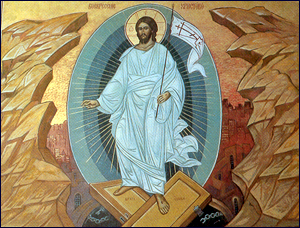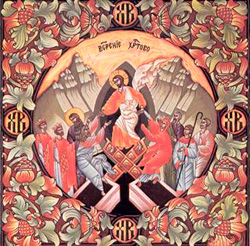Of Christ’s descent into hell we have confirmation in the general epistle of the Apostle Peter, where it is said: “For Christ also hath once suffered for sins, the just for the unjust, that He might bring us to God, being put to death in the flesh, but quickened by the Spirit; by which also He went and preached unto the spirits in prison…” (1 Peter 3:18-19). This clearly shows that Christ descended with His Divinity into the prison of the spirits, i.e. souls, and preached repentance to them. The same is said in another place of the same epistle: “For this cause was the Gospel preached also to them that are dead, that they might be judged according to men in the flesh, but live according to God in the spirit” (1 Peter 4:6).
Much is said in church tradition about Christ’s descent into hell in the sense that He entered the kingdom of death. The Paschal vespers include the singing of wonderful troparia, which begin with the following words: “Today hell weeps and cries out…” They present hell as a weeping and moaning entity. Among other things it is said that the power of hell has been vanquished, since Christ liberated those whom it had dominated for ages. The following words are characteristic: “My power has been obliterated, the Shepherd has arisen and has resurrected Adam…”
 Of great importance in explaining this point is the homily of St. John Chrysostome that is read at the Paschal liturgy. Among other things it says that upon meeting Christ hell “was embittered,… was abolished,… was mocked,… was slain,… was overthrown,… was fettered.” It is further said that upon Christ’s death on the cross hell, having accepted a mortal body, found itself facing God; having accepted the dust of earth, met with heaven; having accepted that which was visible, i.e. a human body, human nature, it was vanquished by that which was invisible, i.e. Divinity. Of great importance in explaining this point is the homily of St. John Chrysostome that is read at the Paschal liturgy. Among other things it says that upon meeting Christ hell “was embittered,… was abolished,… was mocked,… was slain,… was overthrown,… was fettered.” It is further said that upon Christ’s death on the cross hell, having accepted a mortal body, found itself facing God; having accepted the dust of earth, met with heaven; having accepted that which was visible, i.e. a human body, human nature, it was vanquished by that which was invisible, i.e. Divinity.
The Church teaching on Christ’s descent into hell was described by St. John Damascene in one of the troparia of the paschal canon: “Thou didst descend into the nethermost parts of the earth, and didst shatter the eternal bars that held the fettered, O Christ, and on the third day, like Jonah from the whale, Thou didst arise from the tomb.” In one of his paschal homilies St. Epiphanius, bishop of Cyprus, marvelously describes Christ’s descent into hell. He says that Christ descended into hell divinely, victoriously, powerfully, accompanied by myriads of angels. However, before Christ reached the gloomy prisons of hell, the Archangel Gabriel came down there before Him, in order to bring to all the glad tidings of Christ’s coming, since it was also he who had brought glad tidings to the Holy Virgin. He exclaimed: “O gates, raise yourselves.” Archangel Michael added: “Raise yourselves, eternal gates.” The angelic host cried out: “Depart, ye gates of iniquity, collapse, ye invincible chains, tremble, ye iniquitous tyrants!” Christ appeared and caused great awe, agitation, and fear. When all the rulers of hell loudly cried out: “Who is this King of glory?” – the entire angelic host replied with one mighty voice: “The Lord strong and mighty, the Lord mighty in battle, the Lord of hosts, – He is the King of glory.”
Afterwards St. Epiphanius describes Adam’s talk with Christ. Adam heard the footsteps of the approaching Christ just as he had heard them erstwhile in the Garden of Eden after his sin of disobedience. At that time he felt embarrassment and fear, but now he felt joy and elation. Turning to all the other souls, the repentant Adam cried out exultantly: “My Lord is with all.” And Christ replied: “And with thy spirit.” Then, taking him by the hand, Christ resurrected him, telling him of all that had been done for his salvation and for the salvation of all mankind.
 Christ arose from the dead in the early hours of Sunday morning. The exact time of His Resurrection is unknown to us, since no one saw Him at that moment, but the event was confirmed when the Myrrh-bearing Women came to the tomb at dawn, in order to anoint Christ’s body with aromatic oils. Thus Sunday, the first day of the week, is the day of Christ’s Resurrection. If on Saturday He had silently vanquished the kingdom of death, on Sunday everyone knew of it, convinced of the fact that it was He Who vanquished death and the devil. Christ arose from the dead in the early hours of Sunday morning. The exact time of His Resurrection is unknown to us, since no one saw Him at that moment, but the event was confirmed when the Myrrh-bearing Women came to the tomb at dawn, in order to anoint Christ’s body with aromatic oils. Thus Sunday, the first day of the week, is the day of Christ’s Resurrection. If on Saturday He had silently vanquished the kingdom of death, on Sunday everyone knew of it, convinced of the fact that it was He Who vanquished death and the devil.
In the so-called weekly cycle of days Sunday is the first day and the starting point from which the entire week is counted; at the same time, however, it is also the eighth day, because it follows the seventh day, i.e. Saturday. In the Old Testament it is considered to be a very important day, because it is the first day of the creation of the world. Moses does not call the first day of creation the first, but the single day. Also, in interpreting these words, Saint Basil the Great says that the holy Sunday on which Christ arose from the dead is called a single day by Moses, in order to direct our mind towards the future eternal life. Currently Sunday serves as the fore-image of the future life, but afterwards it will be the eighth age (eon) itself. If one thinks of the fact that the weekly cycle symbolizes human life and that Sunday is the fore-image of the future “eighth” age (eon), then that age is truly the one and only day. St. Basil the Great calls Sunday “the source of days,” “the counterpart of light.”
According to St. Gregory Palamas, Sunday is also called the eighth day because on that day took place Christ’s Resurrection, which was the eighth resurrection in the history of mankind. Three resurrections from the dead were wrought in the Old Testament (one by the prophet Elias and two by the prophet Elisha), and four resurrections were wrought by Christ in the New Testament (the daughter of Jairus, the son of the window of Nain, then Lazarus, and finally all those who arose from the dead on Passion Friday). Consequently, the eighth and the greatest resurrection was the Resurrection of Christ. In essence, it is not only the eighth, but also the first in regard to the anticipated resurrection of all the dead at the end of the world.
On Sunday, the first day of creation, light was created. In the resurrection of Christ, on the first day of renaissance, appeared the light of the Resurrection, which is also the light of the Transfiguration and the Pentecost. On that day Christ’s human nature threw off the shackles of mortality and corruption.
Moreover, Sunday is also called a holy day because it is precisely on such a day of the week that the major events in Christ’s life took place. Also, (according to St. Peter Damascene), Christ’s Second Coming is expected to occur on a Sunday, as well as the universal resurrection of the dead. For this reason Christians assign such great significance and importance to this day, and also strive to sanctify it, because the coming of Christ will be sudden.
In view of all these reasons, St. John Damascene triumphantly exults on the day of Pascha: “This is the chosen and holy day, the one king and lord of Sabbaths, the feast of feasts, and the triumph of triumphs, on which we bless Christ unto the ages.”
We are also moved by the thought that every Sunday the Church commemorates Christ’s Resurrection in its wondrous troparia. Thus, besides the annual feast of Pascha, there is also the weekly Pascha, the so-called minor Pascha, or the bright day of Sunday.
Metropolitan Hierotheus (Vlakhos)
|